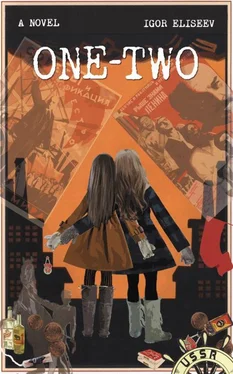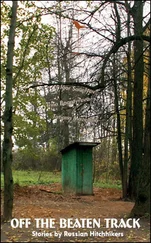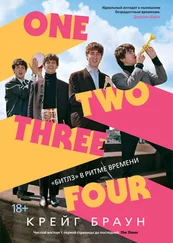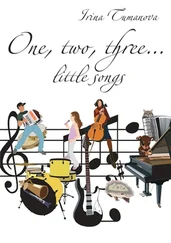I had only said “hello” to some woman, gray and dried up like a mummy, as we passed by the kitchen, so I didn’t know how to react to mother’s remark. Probably, that mummy-neighbor, by chance, had become a witness to our long-awaited meeting. We probably looked completely dejected. Though it was true that our mother was there, in front of us, we still didn’t know how to react. At last she hugged and kissed us, but, as if startled, immediately went into a corner of the room and started setting up a large extension table. She turned away and spoke over her shoulder, grunting:
“The first day after the delivery they said you were dead, but I didn’t believe them and started searching for you, but wherever I went, I faced the same dreadful situation: everybody was silent; nobody said anything. Nevertheless, I had a feeling that you were alive. And I kept searching on and on. I waited for you every day. So many tears I shed at night. Oh, so many. Because of it, my hair turned gray before its time and I lost my good looks. Who is going to take interest in me now? That’s why your father left me; he’s a rascal, if ever I saw one. Is there anybody on earth who can love him more than I did? What a fool he was; he made it worse for himself. After all, it was him who signed the surrender.”
She kept on talking and talking, halting and contradicting her own words, and we stood there riveted to the spot, listening and not knowing what to say, or do. Should we help her lay out the cups or find a suitable way to step aside and not get in her way?
We might have stood there forever but suddenly mother stopped talking. Not finishing her sentence, she turned away to the window and started crying quietly.
As time went on, I began to be gnawed by doubts. Was she just acting, or was I suspicious of her for no good reason?
“Last night I had a nightmare that I was dying,” Mother started talking again, in a voice full of drama. “Air, I need air, I am suffocating,” and she squeezed her neck with her hand as if it was occurring there and then. “I’m trying to shout but I can’t make a sound. I’m trying to move but I can’t budge. I want to call for help, but there is nobody around. I am all alone. My God, how horrible it was! I was so frightened, terrified! So what would happen if I really died? I can’t imagine what you would do without your poor mother who loves you so much.”
“Well, sure, we couldn’t do without her,” I quipped in my mind. “We would be dead for another twenty-something years!”
“Don’t worry, now we are going to take care of you,” you tried to calm her down and make her listen. Your voice was trembling; I couldn’t believe my ears. Where did all your anger go to?
“I can’t tell you how glad I am you came,” our mother almost sang out, and, like a conjurer, produced an old watch literally out of nowhere.
“Here! This is your father’s watch. For merits,” she said with anguish, putting it on your wrist. “You know who granted it to him? This… well… what was that villain’s name… he honored him!”
The more I listened, the less I believed a single word, a single teardrop flowing down her face, her face powdered so heavily it looked like an abstract mask. She doesn’t love us and she never did. She abandoned us because she wanted to. It was her choice. But you, you gave credence to her and thereby suffered together with her; you were so glad to meet Mother! And all this incongruity between your great expectations and reality probably seemed to you a small fee for the long-awaited happiness.
Instead of celebrating and rejoicing at our family reunion – telling stories, sharing impressions, laughing – we were sitting at a laid table, having tea, with terrifying composure. Just imagine, after so many years of separation, we were simply drinking tea as if we had been doing this daily for hundreds of years, having long ago exhausted all subjects of conversation, except one, obviously our mother’s favorite. At great length, exhaustively, Mother enjoyed telling us about herself, rarely asking questions and answering them by herself. She believed that all people were rascals and swindlers. In her hatred she had neither pity nor mercy, and a large number of her curses and unflattering reviews were dedicated to her feckless neighbors and to our father who had dared to offend her and then abandon her. She ignored our questions, withdrawing into herself or looking for an imaginary spoon fallen under the table.
After asking our names, she nearly had a heart attack, reminding me of a stranded fish intermittently opening and closing its mouth. By a miraculous coincidence, Hope and Faith were the names she had dreamt of giving her daughters if ever she’d had normal ones.
“Just think of it, I’ve never had any serious diseases. Why were you born that way?” and she immediately started answering herself. “There is no answer. Congenital deformity is one of life’s deepest mysteries.”
But I knew the answer. A person like her could only produce freaks. Nothing normal could grow in her womb. We are the reflections of her human nature, symbols, deformed symbols, of her view of life.
Tea had cooled down long ago when a second neighbor peeped into the room. First of all, from behind the door appeared an examining lonely eye, then we saw a sniffing nose and then the whole head squeezed into the aperture.
“Here you are! Gennady Karlovich,” Mother exclaimed happily. “Come, come in!” she added impatiently.
This neighbor’s face, perfectly round like a pancake, finally responded to the invitation and expressed the kindest smile. Soon Gennady Karlovich Kucheryavy (Kucheryavy in Russian means “curly”; in slang dodge, agile – a person who is able to be well settled in life) entirely filtered through the doorway, squeezed in as if by miracle. He resembled a huge hog with small piggy eyes, faded eyelashes and rusty hair. Hardly had he appeared before Mother underwent the most improbable, the most unnatural change. Her face lit up like a candle-light at dinner, and she started mumbling something indistinctly, driven either by pleasure or by confusion. Furthermore, once he threw an eye on the refrigerator, she immediately sprang to her feet and began to take out sausage, beet salad and sprats.
“And these are my… come, come, sit down,” mother joyfully muttered. “Just my… well, you know.”
Actually, Gennady Karlovich didn’t, and wasn’t going to; lazily, almost unwillingly he took a seat on two chairs simultaneously, while we were huddling on one with difficulty, and quietly farted.
“Hope and Faith,” mother squeezed out urgently. “And this is Gennady Karlovich. He is such a wonderful person, unlike those menials.” And having waved her hand towards the door, she put newly-baked pasties on the table.
“Oh, how pretty they are!” he muttered cryptically, giving us a playful wink, and the sweetest smile spread all over his face.
“Come on, children, eat well!” and taking a look at us, Mother gave a tragic sigh. “You must be hungry.”
Frankly speaking, we hadn’t eaten anything since morning, our stomachs were knotted with hunger, and our heads went round giddily. But Gennady Karlovich had probably “fasted” (A temporary abstention from taking meals and drinking is referred to here) much longer than us. He was eating in such a manner as if he had been starved of food all his life, stopping only to smooth his scanty hair or to pinch the fur on his chest. His entire organism seemed to consist only of a stomach taking up the biggest part of his jellylike body; he didn’t even chew his food but like an ogre swallowed it whole. I stared at him with barely disguised horror but mother was foolish with adoration. He started on the pasties and didn’t stop until only one remained on the plate – probably, that was his particular expression of courtesy, of generosity. He then proceeded to devour the sausage with beet salad and sprats, having seasoned them with two bowls of soup, and, for “dessert”, he finished off the remaining “courtesy” pasty. He was a gourmet, he informed us, not a glutton.
Читать дальше












